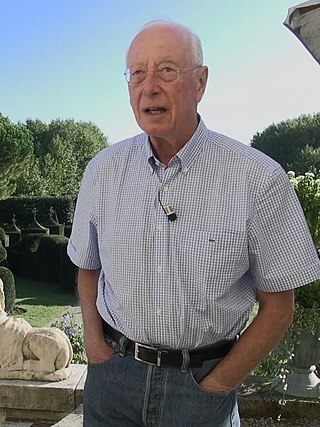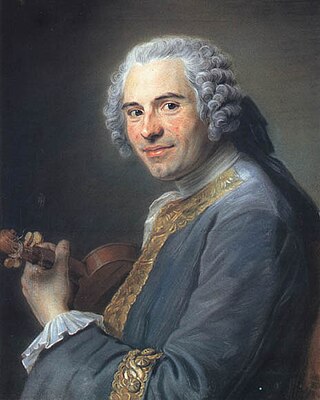
William Lincoln Christie is an American-born French conductor and harpsichordist. He is a specialist in baroque and classical repertoire and is the founder of the ensemble Les Arts Florissants.

In Greek mythology, Comus is the god of festivity, revels and nocturnal dalliances. Cup-bearer of the god Dionysus, he was represented as a winged youth or a child-like satyr. His mythology occurs only in later antiquity. During his festivals in Ancient Greece, men and women exchanged clothes. He was depicted as a young man on the point of unconsciousness from drink, with a wreath of flowers on his head.

Jean-Féry Rebel was an innovative French Baroque composer and violinist.

Stephen Stubbs is a lutenist and music director and has been a leading figure in the American early music scene for nearly thirty years.

Patricia Petibon is a French soprano.
Noémi Rime is a French soprano. She regularly appears in opera productions by William Christie's Les Arts Florissants ensemble. Her roles have included Cleone in Médée, Dido in Dido and Aeneas, and Fatime in Les Indes galantes. She currently teaches on the faculty of the Conservatoire à rayonnement régional de Poitiers.

Jean-Joseph de Mondonville, also known as Jean-Joseph Cassanéa de Mondonville, was a French violinist and composer. He was a younger contemporary of Jean-Philippe Rameau and enjoyed great success in his day. Pierre-Louis Daquin claimed, "If I couldn't be Rameau, there's no one I would rather be than Mondonville".

Médée H.491 is a tragédie mise en musique in five acts and a prologue by Marc-Antoine Charpentier to a French libretto by Thomas Corneille. It was premiered at the Théâtre du Palais-Royal in Paris on December 4, 1693. Médée is the only opera Charpentier wrote for the Académie Royale de Musique. The opera was well reviewed by contemporary critics and commentators, including Sébastien de Brossard and Évrard Titon du Tillet, as well as Louis XIV whose brother attended several performances, as did his son; however, the opera only ran until March 15, 1694, although it was later revived at Lille.

Les Arts Florissants is a Baroque musical ensemble in residence at the Théâtre de Caen in Caen, France. The organization was founded by conductor William Christie in 1979. The ensemble derives its name from the 1685 opera Les Arts florissants by Marc-Antoine Charpentier. The organization consists of a chamber orchestra of period instruments and a small vocal ensemble. Current notable members include soprano Danielle de Niese and tenor Paul Agnew, who has served as assistant conductor since 2007. Jonathan Cohen is also on the conducting staff; Christie remains the organization's artistic director.

Les arts florissants (H.487) is a short chamber opera in five scenes by Marc-Antoine Charpentier.

Paul Agnew is a Scottish operatic tenor and conductor.
The Menus-Plaisirs du Roi was, in the organisation of the French royal household under the Ancien Régime, the department of the Maison du Roi responsible for the "lesser pleasures of the King", which meant in practice that it was in charge of all the preparations for ceremonies, events and festivities, down to the last detail of design and order.

David et Jonathas, H.490, is an opera in five acts and a prologue by the French composer Marc-Antoine Charpentier, first performed at the Collège Louis-le-Grand, Paris, on 28 February 1688. The libretto, by Father François Bretonneau, is based on the Old Testament story of the friendship between David and Jonathan.

Jean-Baptiste Lully was a French composer, dancer and instrumentalist of Italian birth, who is considered a master of the French Baroque music style. Best known for his operas, he spent most of his life working in the court of Louis XIV of France and became a French subject in 1661. He was a close friend of the playwright Molière, with whom he collaborated on numerous comédie-ballets, including L'Amour médecin, George Dandin ou le Mari confondu, Monsieur de Pourceaugnac, Psyché and his best known work, Le Bourgeois gentilhomme.

François les bas-bleus is an opéra comique in three acts of 1883, with a French libretto by Ernest Dubreuil, Eugène Humbert, Paul Burani, and music by Firmin Bernicat, completed by André Messager.
Le Concert Spirituel is a French ensemble specialising in works of baroque music, played on period instruments. Founded by Hervé Niquet in 1987, it is named after the 18th-century concert series Concert Spirituel. The group performs internationally, playing mostly rarely performed sacred music and operas, and making recordings. Its focus is on French music played at the court of Versailles.
Yvon Repérant is a French harpsichordist and organist, singing leader and musicologist.

Jean-François Gardeil is a French baritone and theatre director. He is also the founder and artistic director of the Chants de Garonne.
Jean-François Novelli is a contemporary French tenor born in Fontainebleau.
Patrick Cohën-Akenine is a French classical violinist and conductor.














